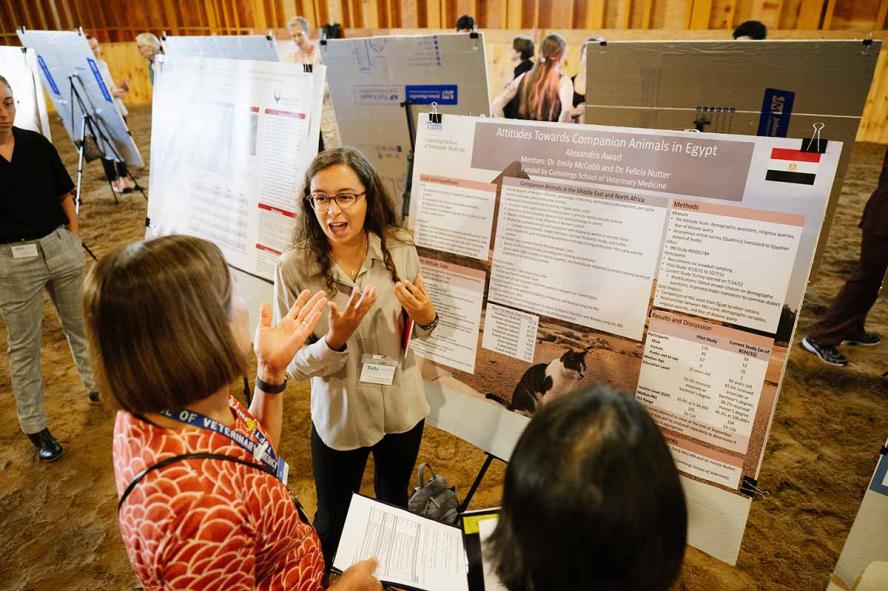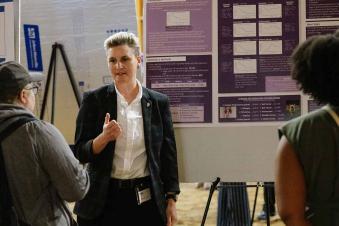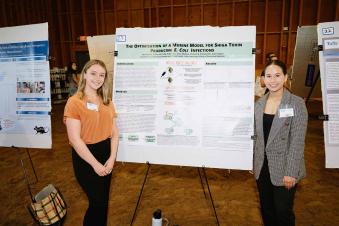-
About
- Leadership & Faculty
- News & Events
-
Admissions
-
Academics
- Graduate
- Advanced Clinical Training
- Continuing Education
- Academic Departments
- Academic Offices
- Simulation Experiences
-
Student Life
- Offices
-
Research
-
- Transformative Research
- Centers & Shared Resources
-
-
Hospitals & Clinics
- Emergency Care
- Hospital Services
-
Community Outreach
- Volunteer
Veterinary Research Day Celebrated
Cummings School students present results of innovative projects at annual event

Thirty-five Cummings School of Veterinary Medicine second- and third-year students presented the results of their self-initiated projects during the 33rd Annual Veterinary Research Day, held at the Equine Sports Medicine Complex September 2.
Students shared a wide variety of clinical, basic, and field research projects, which included studies of animals such as bats, dogs, harbor seals, geese, gray squirrels, mice, monitor lizards, pigs, primates, rabbits, rats, sea turtles, sturgeon, terns, and wild dogs.
A 2019 trip to Egypt by Cummings School’s Alexandra Awad, V24 (she/her/hers), inspired her research project, “Attitudes Towards Companion Animals in Egypt.” She explains, “Being half-Egyptian, I was always attuned to the differences in perspectives when comparing the United States to Egypt. After spending time in a small animal general practice during my visit to Egypt, I felt I could help improve their medicine. It was important for me to understand the views of Egyptians, and I learned a lot about the psychology behind pet ownership through this research project.
"I hope to practice medicine in Egypt someday, and potentially open a small animal clinic there. Understanding owners and how their culture impacts their human-animal relationship will be crucial to my success as a general practitioner.”
Offered as an opportunity to explore a topic of personal/professional interest during their first two years of the four-year Doctor of Veterinary Medicine program, students are mentored by Cummings School faculty members.
Funding needs are met by either the school and its active research laboratories, private funds or gifts, or outside foundations or organizations, such as the U. S. Department of Agriculture and the National Institutes of Health. Five students traveled internationally to complete their research, visiting British Columbia, Jamaica, Namibia, Rwanda, and South Africa.
In addition to D.V.M. students, current graduate students, residents, and post-doctoral candidates are also invited to make research presentations, which typically adds about 15 presenters.
The Massachusetts Institute of Technology co-sponsors the event, as a collaborator with Cummings School for the research program. Student participants from both institutions are invited to conduct research at either school, and they attend lectures and field trips together while working on their respective projects.
Deirdre Givens Mandryk, V25 (she/they), worked at The Dog Aging Project at The Broad Institute of MIT and Harvard for her research, “Cardiac Disease in Small Dogs: results from the Dog Aging Project.”
Their love of canines sparked their project. “I am passionate about canine genetics and breeding healthier dogs. Working in this lab allowed me to share my passion and learn from people who have the answers to make change.”
She professes an important lesson from the experience. “Through this research I learned that collaboration – not competition – is the key to progressing science,” Deirdre contends. “The realization that as a veterinarian I can collaborate with researchers to improve animal health and welfare has opened more career possibilities for me.”
Following a morning session of research poster presentations, Dr. Carol Reinero, professor and director of comparative internal medicine at the University of Missouri, presented the keynote speech via Zoom titled, “My Journey as a Clinician Scientist: Straight Lines are Overrated.”
In an afternoon ceremony held in Varis Lecture Hall, Cummings School Dean Alastair Cribb and Cheryl London, V90, associate dean of research and graduate education, presented the top researchers with awards for their presentations as follows:
Graduate Students:
Ph.D. candidate Laura Borkenhagen was lauded for “Inference of Viral Phenotype through Machine learning Approaches – An Influenza Test Case” and Rachel Kanefsky, V24, was recognized for “Mucin 4 is a Marker of Bronchitis and Bronchiolitis in Influenza A Virus Infection.”
Basic Research:
Tara Francis, V25, and Chloe Hill, V25, were honored for “The Optimization of a Murine Model for Shiga Toxin Producing E. coli Infections,” and Hannah Reichert, V24, was cited for “Hepatic Cytokine Profile of Alcohol-fed, IL-1β Transgenic Mice: a Potential Model of Alcoholic Steatohepatitis.”
Resident:
Katie Dittrich, was recognized for “Gene Expression Signatures Predict Response to Chemoimmunotherapy in Canine Diffuse Large B Cell Lymphoma.”
Clinical:
Nicole Moyer, V25, was honored for “Using Extracellular Vesicles to Treat Progressive Canine Mitral Valve Degeneration.”
International/Conservation Medicine:
Elise Westervelt, V24, was lauded for “Spatial heterogeneity in Highly Pathogenic Avian Influenza Outbreaks Among Terns and Gulls in New England.”
To conclude the ceremony Dr. Heather Gardner, Tufts University alum and assistant professor in the Departments of Clinical Sciences and Comparative Pathobiology, was presented with the annual Junior Faculty Research Award, recognizing both the contributions she has made to the field of research as well as the potential for continued impact in the future. Her laboratory efforts center on comparative and translational oncology, using the tumor genome to inform novel therapeutic approaches.

